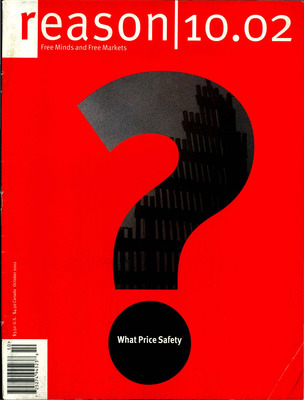15 Years After 9/11, Will the West Shut Itself Down To Freedom Like the Arab World Has?
The 2016 election is ultimately a fight between a future based on freedom and a bunker mentality in trade, culture, and immigration.

Over at FoxNews.com, the ambassador from the United Arab Emirates (UAE) to the United States, Yousef Al Otaiba, makes a bold pronouncement that "it is Arabs who have the most at stake" in the fight against Islamic jihad and that the Arab world, which supplied all of the 9/11 hijackers, needs to create a more-viable future for its inhabitants.
In the UAE, we are advancing moderation in both our schools and places of worship. Our education system is built to reinforce Islam's true values based on dialogue, tolerance, moderation, and peace. And in our mosques, we are modernizing the way Islam is taught, developing new training programs for imams and updating Koranic commentaries.
We also recognize the vital importance of skills training and job opportunities for youth at home and across the region to encourage their entrance into the workforce rather than let them fall prey to terrorist recruitment.
Fifteen years after 9/11, the long war against extremism continues. It is now a global fight against a borderless plague. While every country is at risk, today it is Arabs who have the most at stake. And it is Arabs who must lead in this fight for tolerance and humanity, with force and with ideas, where we pray and where we live, online, in the classroom and on the battlefield.
This is all well and good but it also runs up against the hard limit of how Arab governments typically rule their countries: with an iron hand. Hardly the worst of the bunch, UAE still ranks as "not free" by Freedom House and most other international watchdogs. Years after the Arab Spring, things are generally bad all over the region and unlikely to change anytime soon. How can you advance the sort of freedom and dynamism that blunts the allure of jihad while constantly cracking down on all sorts of expressive activities ranging from artistic freedom to press freedom to political freedom? The short answer is that you can't.
Yes, the Arab world has the most at stake when it comes to Islamic terrorism. The rest of the world, particularly the developed world, has in many important ways already learned to live with it (not always well, as in the case of incursions on civil liberties). Long before 9/11, the Arab world was in many ways cut off from modernity and any sense of future. In terms of trade and culture, it was and remains relatively cut off from the world (just 330 books are translated annually from English into Arabic).
Until that changes, very little else can change, and there are ultimately very few things the "West" can do. Certainly military occupation has come a cropper in terms of liberalizing politics in the region. If military intervention isn't the answer—and the past 15 years say No! in thunder—trade, diplomacy, and real cultural exchange (that is, vulgar pop culture, not state-sponsored piano recitals and the like) provides a path forward. The developed world needs to be confident in our broadly libertarian values and ways of life, not to apologize for or close ourselves off due to fear of a terrorism that is in no way an existential threat to "our way of life." We should defend ourselves forcefully and unapologetically but to the extent that both the Democratic and Republican parties push protectionism, apocalypticism, and repression in terms of expressive freedom and they both want to double down on failed and continuing military interventions, well, we're hardly giving anyone a future worth building, much less defending. To that extent, it's good to hear Libertarian candidates Gary Johnson and William Weld talk about opening up our country, to immigrants (who can be legally vetted), trade, and the sort of technological and personal freedoms that are the first, best answer to death cults of any sort.


Show Comments (256)